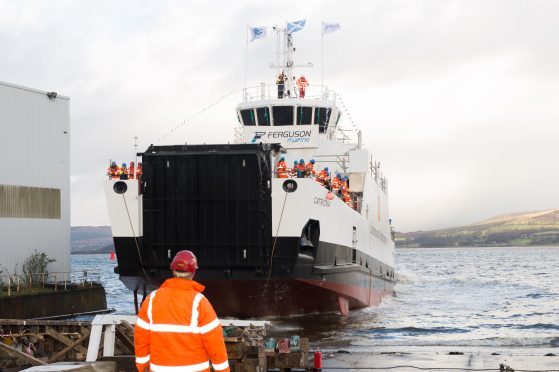The third of a trio of Glasgow-built, low-emission ferries was launched on the Clyde yesterday.
The MV Catriona, built by Ferguson Marine Engineering (FMEL) at a cost of £12.3million, will join the fleet of the Clyde and Hebrides Ferry Service next year.
MV Catriona and its sister ships − MV Hallaig and MC Lochinvar − are the world’s first seagoing passenger and vehicle roll-on roll-off ferries to boast a low-carbon hybrid system of diesel electric and lithium ion battery power.
Analysis of Hallaig’s performance indicates that the ships consume about 38% less fuel than conventionally powered vessels of the same size.
Hallaig, launched in 2011, services the Sconser to Raasay route, while the Lochinvar has sailed between Tarbert and Portavadie since it first hit the water in 2013.
Catriona, which has yet to undergo sea trials, will be assigned to a route early next year.
At 43.5metres long, it has room for 150 passengers, 23 cars or two HGVs and is owned by Caledonian Maritime Assets (CMAL).
CMAL chairman Erik Ostergaard said: “We are very proud that the design and construction of this new class of ferry, using world class technology, was carried out in Scotland, continuing a proud tradition of shipbuilding on the Clyde.”
Catriona is the first ship built by Ferguson Marine Engineering following its takeover of the Ferguson Shipbuilders business, which had gone into administration. The previous two hybrid vessels were also constructed in the same yard in Port Glasgow.
FMEL managing director Liam Campbell thanked CMAL and the Scottish Government for placing the order with his company, and said the contract had boosted the entire Inverclyde community.
Martin Dorchester, managing director of Caledonian MacBrayne (CalMac), which operates the Clyde and Hebrides Ferry Service, said: “We look forward to welcoming this, the third vessel in this class, to our fleet and working with CMAL to get her in service as quickly as possible. The further adoption of hybrid technology reinforces CalMac’s position as the UK’s most innovative ferry operator.”
Transport and Islands Minister Derek McKay said: “Delivery of this third hybrid vessel not only underlines the Scottish Government’s commitment to making our ferry fleet sustainable and reliable, but it also showcases the expertise on offer at the FMEL shipyard. The technology used on the new vessel will mean it will be fuel efficient and have lower maintenance costs, whilst still ensuring a quality service for passengers.”
